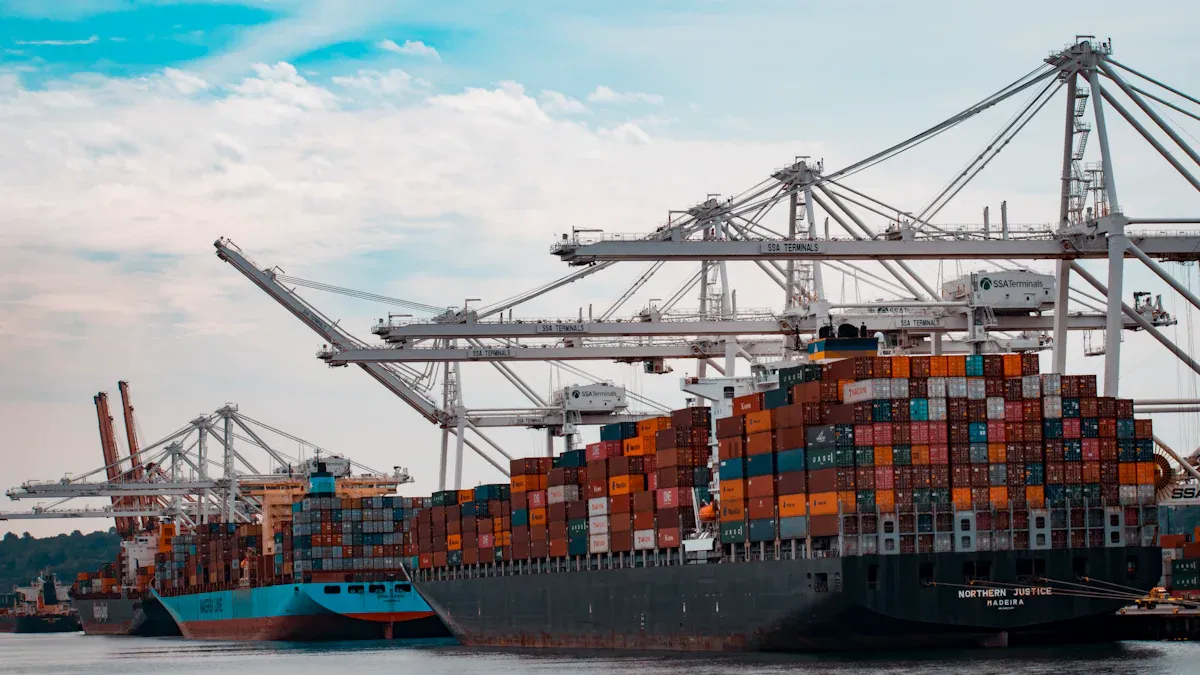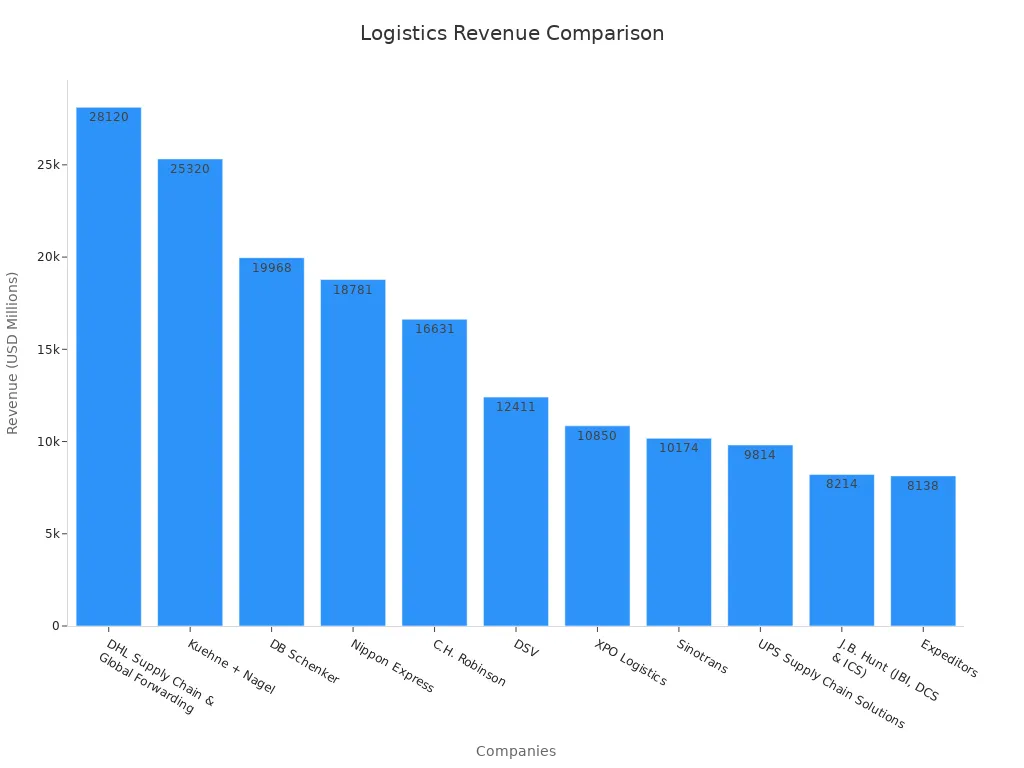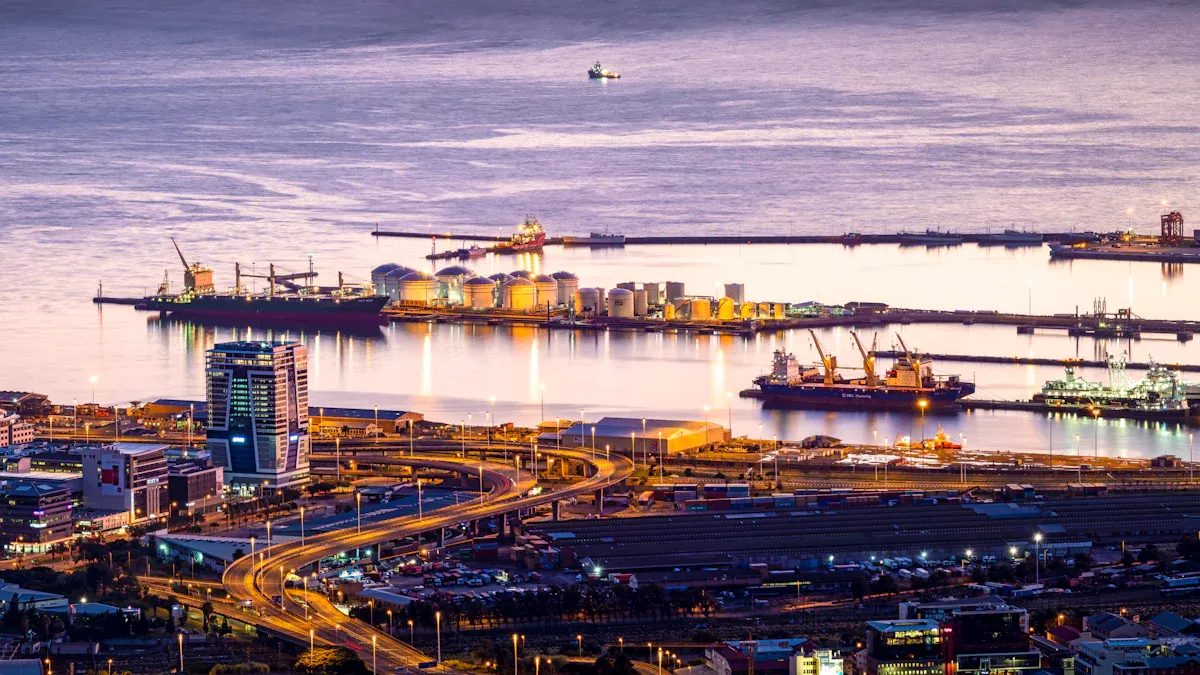International Logistics in South Africa
Chinafrica simplifies international logistics in South Africa, offering AI-optimized air/sea freight solutions that reduce costs by 20%. Our team of experts handles SARS registration, ITAC licensing and customs clearance (5-day processing), while automated warehousing and door-to-door delivery reduce transit times.
type
status
date
slug
summary
tags
category
icon
password

International logistics drives South Africa’s global trade and business growth. Companies rely on strong transport networks to move goods, especially when importing from China. Over 80% of South Africa’s trade by volume uses maritime routes, and air cargo at O.R. Tambo International Airport surpasses 400,000 metric tons each year.
Statistic Description | Value / Trend |
Trade handled by maritime transport (volume) | 80% |
Air cargo at O.R. Tambo Intl Airport | |
China-Africa trade volume (2023) |
Logistics partners help navigate customs, compliance, and cross-border hurdles, ensuring businesses stay competitive.
Key Takeaways
- South Africa’s international logistics market is growing fast, connecting local businesses to global trade, especially with China.
- Choosing the right transport mode—air, sea, or express—helps balance speed, cost, and reliability for shipments.
- Customs rules in South Africa are strict; accurate paperwork and compliance prevent delays and extra costs.
- Value-added services like warehousing, packaging, and door-to-door delivery improve efficiency and customer satisfaction.
- Partnering with experts like Chinafrica ensures smooth customs clearance, cost savings, and reliable delivery from China to South Africa.
International Logistics Overview
Definition
International logistics covers the movement, management, and distribution of goods and information across borders. In South Africa, this industry connects local businesses to global markets, especially China. The market includes services such as freight forwarding, warehousing, and third-party logistics. These services help companies move commercial cargo by air, sea, rail, and road. The sector does not include passenger transport or personal shipping.
South Africa’s logistics market stands out as the fastest-growing in the Middle East and Africa region. The country’s logistics revenue is expected to reach USD 92.7 billion in 2024 and grow to USD 137.4 billion by 2030, with a strong 6.8% annual growth rate. Transportation services make up the largest segment, while warehousing and distribution are growing the fastest.
Metric | Value |
Market revenue in 2024 | USD 92.7 billion |
Market revenue in 2030 | USD 137.4 billion |
CAGR (2024-2030) | 6.8% |
South Africa's share of global logistics market revenue (2024) | 2.4% |
Regional status | Fastest growing market in Middle East & Africa |
Largest segment | Transportation services |
Fastest growing segment | Warehousing and Distribution Services |
Business Impact
International logistics plays a key role in helping South African businesses compete worldwide. Companies that import from China depend on reliable logistics to keep costs low and deliveries on time. The industry supports growth by making it easier to manage customs, track shipments, and handle large volumes of goods.
- The logistics sector in South Africa:
- Drives business expansion by connecting local companies to global suppliers.
- Reduces delays and risks in cross-border trade.
- Supports government plans to improve ports and railways, with over USD 411.9 million invested in infrastructure projects.
- Grows steadily, with a projected 3.5% annual increase in freight and logistics activity over the next five years.
A strong international logistics partner helps businesses avoid costly mistakes and stay ahead of competitors. Choosing the right provider ensures smooth imports from China and supports long-term success.
Main Transport Solutions

South Africa’s international logistics sector relies on several main transport modes. Each mode offers unique benefits for businesses importing goods from China. Companies must choose the right solution to balance speed, cost, and reliability.
Air Freight
Air freight stands out for its speed and reliability. Many businesses use air cargo when they need fast delivery or must ship high-value goods. The growth of e-commerce has increased demand for air freight, making it a top choice for urgent shipments. Modern technology, such as real-time tracking and AI route optimization, improves efficiency and security. Airports use electric and hybrid cargo aircraft to reduce environmental impact while keeping shipments safe.
Performance Metric | Air Freight Advantage |
Speed | Delivers goods much faster than sea freight. For example, New York to London takes about 1 day by air, but 7-10 days by sea. |
Real-time Tracking | Provides instant updates on shipment status, helping businesses make quick decisions. |
Global Reach | Connects cities worldwide, making it easy for companies to access global suppliers and customers. |
Reduced Packaging | Needs less packaging because of fewer handling points and lower damage risk. |
Security | Airports have strict security, reducing the risk of cargo damage or theft. |
Cost | More expensive than sea freight. For example, shipping a 900 kg box from Shenzhen to Los Angeles costs about $8,000 by air, compared to $1,500 by sea. |
Environmental Impact | Produces higher CO2 emissions than sea freight. For example, 2 tons shipped over 5,000 km creates 6,605 kg CO2 by air, but only 150 kg by sea. |
Air freight works best for urgent, high-value, or time-sensitive shipments. Businesses that need fast delivery often choose this mode, even if it costs more.
Sea Freight
Sea freight is the backbone of international logistics in South Africa. Over 80% of trade by volume moves through the country’s ports. Sea freight offers the most cost-effective solution for large shipments. It is ideal for bulky or heavy goods that do not require fast delivery. Ships can carry huge volumes, making sea freight the best choice for businesses looking to save on transport costs.
A scientific study shows that combining sea and air freight (intermodal transport) can help companies balance cost, speed, and environmental impact. This approach reduces reliance on air transport, lowers emissions, and keeps logistics competitive.
Many businesses use sea freight for regular imports from China. They benefit from lower costs and reliable schedules, especially when shipping large quantities.
Express Delivery
Express delivery services provide the fastest option for international shipments. Companies like DHL, DSV, and UPS offer express solutions that guarantee delivery within days. These services use both air and road networks to move packages quickly. Express delivery is perfect for small, urgent shipments or samples that need to reach customers fast.
Digitalization and automation play a big role in express delivery. Real-time tracking, automated sorting, and AI-powered route planning help ensure packages arrive on time. Express services also focus on sustainability, using electric vehicles and green energy to reduce their carbon footprint.
Comparing Major Logistics Companies
South Africa’s logistics market features several global and local players. Each company offers different strengths:
Rank | Company Name | 2018 Gross Logistics Revenue (USD Millions) |
1 | DHL Supply Chain & Global Forwarding | 28,120 |
2 | Kuehne + Nagel | 25,320 |
3 | DB Schenker | 19,968 |
6 | DSV | 12,411 |
9 | UPS Supply Chain Solutions | 9,814 |

- DHL leads the market with the highest revenue and a strong global network.
- DSV and UPS offer reliable express and freight services, with advanced tracking and customer support.
- Imperial Logistics and Buffalo International are key local players, focusing on road and regional solutions, though they do not match the global scale of DHL or DSV.
Road freight dominates South Africa’s logistics sector, handling nearly 50% of total freight volume. The country’s extensive road network connects ports, industrial zones, and inland markets. Rail freight is growing, with Transnet expected to handle up to 165 million tons as modernization continues. Marine and air freight remain vital, especially for international shipments.
Chinafrica’s Multi-Channel Solutions
Chinafrica stands out by offering multi-channel solutions that help clients choose the most cost-effective and efficient route for their shipments. Their advanced channel allocation algorithms, such as SPCA and CIBA, boost network performance and manage interference better than single-channel systems. In practical terms, this means Chinafrica can deliver up to 1.8 times higher capacity in complex networks, ensuring faster and more reliable service.
Chinafrica’s multi-channel approach gives businesses flexibility. Clients can combine air, sea, and road transport to match their budget and delivery needs. This strategy can cut logistics costs by up to 20% and improve delivery times.
- Multimodal transportation balances speed and cost, letting businesses optimize every shipment.
- Automation in warehousing and route planning reduces expenses by up to 25%.
- Technology like AI, IoT, and big data analytics improves tracking and supply chain visibility.
Shippers and carriers now focus on cost efficiency and sustainability. Chinafrica helps clients track emissions, use fuel-efficient routes, and select the best carriers. Their solutions support both cost savings and environmental goals.
Choosing Chinafrica means getting expert advice, advanced technology, and a partner committed to your business success. Their multi-channel solutions make international logistics from China to South Africa simple, affordable, and reliable.
Customs and Compliance

Import Regulations
South Africa enforces strict import regulations to protect its economy and ensure fair trade. Every importer must register with the South African Revenue Service (SARS). Import permits, issued by the International Trade Administration Commission (ITAC), usually take about five working days to process. Importers must submit a Single Administrative Document (SAD) for each shipment. Customs duties average 5.8%, but some products like garments and cars face much higher rates. Import controls require licenses for certain goods, and certificates such as phytosanitary or veterinary documents may be necessary.
Aspect | Details |
Importer Registration | Required with SARS |
Import Permits | ITAC issues within ~5 working days |
5.8% (garments 40%, cars 34%) | |
Customs Clearance Document | SAD mandatory |
Compliance Emphasis | Strict procedures, documentation accuracy, risk-based inspections |
Clearance Time for Permits | Typically 5 working days |
Import Controls | Licenses and certificates for certain goods |
Customs Threshold | Duties apply above ZAR 500 |
Trade Agreements Impact | Preferential rates under SACU, COMESA, EU EPA, etc. |
Importers who fail to follow these rules face delays, penalties, or even shipment confiscation. Accurate paperwork and compliance with trade agreements help businesses save money and avoid trouble.
Clearance Process
The customs clearance process in South Africa can challenge even experienced companies. Each country has unique customs requirements, tariff schedules, and restricted items. Advanced filing rules require electronic submission of shipment data before goods arrive at the border. Risk-based inspections and heavy traffic at border posts often cause delays. Incorrect or missing documents, such as import permits, lead to penalties and longer clearance times.
- Customs clearance requires:
- Compliance with SARS regulations
- Accurate tariff classification
- Complete and correct documentation
Many businesses struggle with low-quality declaration information and limited data sharing with logistics providers. Customs agencies sometimes face capacity constraints, which can slow down the process. Trade agreements, like SACU and COMESA, offer tariff benefits but require strict compliance.
Chinafrica helps clients overcome these challenges. Their team manages all paperwork, ensures accurate classification, and submits documents electronically. They guide clients through every step, reducing the risk of errors and penalties. With Chinafrica, businesses enjoy faster clearance, lower costs, and peace of mind.
Choosing Chinafrica as a logistics partner means smoother customs clearance and reliable compliance support. This advantage keeps shipments moving and businesses growing in the world of international logistics.
Value-Added Services
Warehousing
Warehousing forms the backbone of efficient international logistics. Companies use modern warehouses to store goods safely, manage inventory, and prepare shipments for delivery. Advanced technology, such as real-time tracking and automated sorting, helps reduce transit times by nearly 50%. Businesses benefit from lower costs and faster order processing. The rise of e-commerce and globalization drives demand for flexible storage solutions. Many companies now rely on third-party logistics (3PL) providers for scalable warehousing, which can cut operational costs by up to 80% through automation and smart management systems.
Chinafrica offers secure, tech-enabled warehouses in key locations. Their team manages inventory, tracks goods, and prepares shipments for fast dispatch. Clients enjoy peace of mind, knowing their products stay safe and ready for delivery.
Packaging
Proper packaging protects goods during transport and ensures they arrive in perfect condition. Companies use sustainable materials and smart designs to reduce waste and meet environmental standards. Packaging also supports branding and customer satisfaction. Technology, such as automated packing lines, speeds up the process and lowers costs. In South Africa, businesses see packaging as a key part of the supply chain, especially for fragile or high-value items.
- Chinafrica provides expert packaging services:
- Custom solutions for different product types
- Eco-friendly materials for green logistics
- Automated systems for speed and accuracy
Clients save time and money while meeting both regulatory and customer demands.
Door-to-Door
Door-to-door delivery brings goods directly to the customer’s location. This service covers the entire journey, from the supplier in China to the final address in South Africa. Last-mile delivery makes up 53% of total shipping costs, making it the most expensive and critical part of logistics. The South African market sees rapid growth in last-mile delivery due to e-commerce and rising consumer expectations for fast, reliable service. Companies use AI-powered route optimization and real-time tracking to improve efficiency and meet tight deadlines.
Benchmark/Statistic | Description | Benefit Highlighted |
Last-mile delivery costs | 53% of total shipping costs | Shows need for efficient, optimized delivery |
Transit time reduction | Tracking tech cuts transit times by nearly 50% | Faster, more reliable deliveries |
E-commerce impact | Drives demand for fast, scalable logistics | Supports business growth and customer satisfaction |
Green logistics adoption | Electric vehicles, eco-friendly packaging | Meets sustainability goals and reduces costs |
Chinafrica stands out with seamless door-to-door solutions. Their English-speaking team offers free procurement help, clear communication, and smooth last-mile delivery. Clients trust Chinafrica to handle every step, from pickup in China to delivery at their door—saving time, reducing risk, and boosting satisfaction.
Choosing a Logistics Partner
Selection Criteria
Selecting the right logistics partner shapes the success of any business involved in International Logistics. South African companies look for partners who deliver on time, keep costs low, and provide excellent service. Reliability stands out as the most important factor. Companies measure reliability using delivery time, order accuracy, and lead time. These performance indicators help businesses track how quickly and accurately goods arrive.
Researchers use advanced models to confirm the best selection criteria. Studies show that infrastructure, skilled workers, and a strong institutional environment matter most. High scores in these areas mean a logistics partner can handle complex shipments and adapt to changing rules. Companies also use dashboards and scorecards to monitor key metrics in real time. This approach helps them make smart decisions and improve performance.
A reliable logistics partner reduces delays, prevents costly mistakes, and keeps customers happy. Choosing a partner with strong infrastructure and skilled staff leads to better results.
Key factors to consider:
- Delivery speed and accuracy
- Cost transparency and value
- Service quality and communication
- Technology for tracking and reporting
- Flexibility and problem-solving ability
Chinafrica Advantage
Chinafrica offers unique benefits for South African businesses importing from China. Their team uses advanced technology to track shipments and optimize routes. Clients receive real-time updates and clear communication every step of the way. Chinafrica’s strong infrastructure and skilled staff ensure smooth customs clearance and fast delivery.
Many South African entrepreneurs share positive stories about working with Chinafrica. One business owner in Johannesburg reported a 30% reduction in shipping costs after switching to Chinafrica. Another client praised the company’s fast response and ability to solve customs issues quickly. These success stories highlight Chinafrica’s commitment to customer satisfaction.
Chinafrica stands out as a trusted partner in International Logistics. Their focus on reliability, cost savings, and excellent service helps South African businesses grow and succeed in global trade.
South African businesses rely on international logistics to reach global markets, boost efficiency, and drive economic growth. The industry’s value and impact stand out:
Aspect | Summary |
Industry Value | |
Employment | Over 667,000 jobs |
GDP Contribution | Exports: 33.44%, Imports: 31.46% |
Business Benefits | Expands market reach, attracts investment |
A trusted partner like Chinafrica helps companies overcome challenges, use new technology, and deliver goods faster. Companies seeking reliable service should contact Chinafrica for their next import from China.
FAQ
How long does shipping from China to South Africa usually take?
Shipping times depend on the method. Air freight takes 3–7 days. Sea freight takes 20–35 days. Express delivery can arrive in 2–5 days. Chinafrica helps clients choose the fastest and most reliable option for their needs.
What documents do I need to import goods into South Africa?
Importers need a SARS registration, an import permit from ITAC, and a completed Single Administrative Document (SAD). Chinafrica’s team guides clients through every step, making the process simple and stress-free.
Can Chinafrica handle customs clearance for my shipments?
Yes! Chinafrica manages all customs paperwork and compliance. Their experts ensure accurate classification and fast clearance. Clients avoid delays and penalties by trusting Chinafrica with their shipments.
What are the main benefits of using Chinafrica for logistics?
Chinafrica offers multi-channel transport, real-time tracking, and expert support. Clients save money, receive fast deliveries, and enjoy peace of mind. Chinafrica’s solutions help businesses grow and succeed in global trade.
Does Chinafrica offer door-to-door delivery?
Absolutely! Chinafrica provides seamless door-to-door service. Their team handles everything from pickup in China to delivery at your address in South Africa. Clients experience convenience and reliability every step of the way.
Regarding how to calculate the billing size for international logistics transportation, please refer to this article. After learning it, you can easily calculate the international shipping costs yourself!
https://www.chin-a-frica.store/Knowledge-1
Loading...